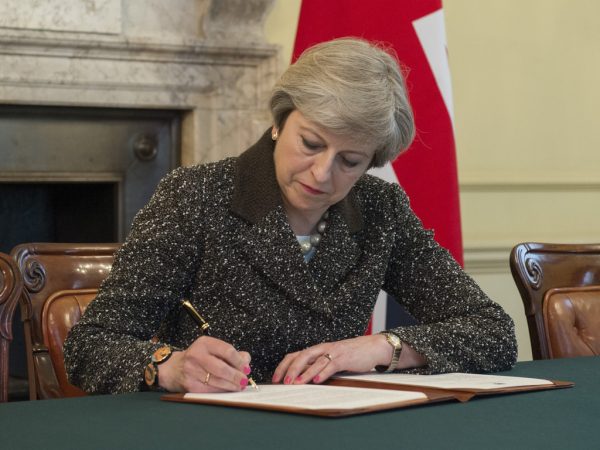The Labour Party
Labour’s manifesto, which sets out its vision of an economy that “really works for the many, and not only for the few”, includes a pledge to double the size of co-operative sector with support from new regional development banks.
There are also commitments on issues of concern to the movement, such as fair tax, human rights in supply chains and company pay ratios.
It is possible that the co-op movement could benefit from other policies, from the return of public transport and utilities to public ownership to measures to support small and medium sized enterprises (SMEs) and protect community assets.

Policies to support co-ops
- A pledge for “legislation to create a proper legal definition for co-operative ownership”.
- Support for businesses across the country will come from a National Investment Bank lending £250bn via network of regional banks which “will deliver the finance that our small businesses, co-operatives and innovative projects need across the whole country”. These “will be charged with helping support our co-operative sector”.
- “Labour will aim to double the size of the co-operative sector in the UK, putting it on a par with those in leading economies like Germany or the US.”
- Widening ownership of economy to take it out of hands of “a narrow elite”. “More democratic ownership structures would help our economy deliver for the many and lead to a fairer distribution of wealth.”
- Introducing a “right to own”, making employees the buyer of first refusal when the company they work for is up for sale.
- Labour would support the creation of publicly owned, locally accountable energy companies and co-operatives to rival existing private energy suppliers, with at least one in every region.
- On sport, Labour will give football supporters the opportunity to have a greater say in how their clubs are run, giving accredited supporters’ trusts the ability to appoint and remove at least two club directors and to purchase shares when clubs change hands. There will be a wider review of fan participation in sports governance.
Related: For report on the Co-operative Party policy plaform
Policies which could benefit co-ops
- Support for SMEs to put them “at the centre of our economic strategy”. Measures include “reintroducing the lower small profits rate of corporation tax. We will also exclude small businesses from costly plans to introduce quarterly reporting and take action on late payments.”
- Industrial strategy that invests in “the sectors of the future such as renewables”.
- Action for a “more diverse banking system, backed up by legislation”. Labour would “take a new approach to the publicly owned RBS, and launch a consultation on breaking up the bank to create new local public banks that are better matched to their customers’ needs”.
- Tackle a business culture which has led to scandals such as the collapse of BHS, amending company law “so that directors owe a duty directly not only shareholders, but to employees, customers, the environment and the wider public”.
- Plans for public ownership of rail and water contain no mention of a co-op model of public ownership but Labour would: bring private rail companies back into public ownership as their franchises expire; create a network of regional publicly owned water companies; reverse the privatisation of Royal Mail.
- Labour will give communities more power to shape their town centres, by strengthening powers to protect post offices, community pharmacies, high street banks, sports clubs, pubs and independent shops.
Issues where the co-op movement has been campaigning
- Fair tax: tackling tax avoidance through a Tax Transparency and Enforcement Programme, and closing down tax loopholes.
- Respecting workers’ rights and equal opportunities, protecting the environment, providing training, and paying suppliers on time. Labour will expect firms supplying the government “to reduce boardroom pay excesses by moving towards a 20:1 gap between the highest and lowest paid”.
- On Brexit trade deals, there is no mention of Fairtrade but “Labour will build human rights and social justice into trade policy. We will ensure that trade agreements cannot undermine human rights and labour standards.”
- It will also guarantee the least developed countries continued access to the market to protect vital export revenues.
- Labour supports the UN Sustainable Development Goals (SDGs) agreed globally to eradicate poverty and protect the environment and would develop a cross-government strategy for ensuring the SDGs are implemented.
Claire McCarthy, general secretary of the Co-op Party, Labour’s sister party, said: “It is a testament to the value of our relationship that Labour goes into this election with a manifesto that has co-operation at its core.
“Whether a pledge to double the size of the UK co-operative economy or support for employee ownership, these are ideas that the Co-operative Party and wider movement have worked together to develop and champion.”
She added: “Perhaps what is most encouraging is that this Labour manifesto contains not just solid commitments to the immediate needs and priorities of the movement, but also to seeing our values proactively shape our wider economy and society. Commitments on community-owned renewable energy and fan ownership show an understanding that models of democratic and mutual ownership can be the building blocks of a Britain where power and wealth are genuinely shared.”
Responding for the Social Economy Alliance, Ed Mayo, secretary general of Co-operatives UK, said: “The Labour manifesto contains a very welcome and ambitious commitment to creating a more inclusive economy. I applaud the fact that the major parties are coming forward with proposals to share the benefits of business more widely across the UK. Co-operatives and the wider social economy are accelerators for equality and we want to see a government that understands all forms of enterprise and can nurture a more sustainable and inclusive economy.
“Some of the best parts of Labour’s manifesto from a co-operative perspective are new, never leaked and a welcome sign that Labour recognises the need to put substance behind action beyond the state, where people are empowered to meet their own needs and aspirations, through their livelihoods, in their communities and in the market.”
Related: Social Economy Alliance launches manifesto for an inclusive economy

The Liberal Democrats
The Liberal Democrat manifesto sets its sights on replacing Labour as the main opposition party and its main focus is on opposing Brexit, public service reform and devolution.
But there are also measures covering co-operatives and employee ownership:
- Encourage employers to promote employee ownership by giving staff in listed companies with more than 250 employees a right to request shares, to be held in trust.
- Strengthen worker participation in decision-making, including staff representation on remuneration committees, and the right for employees of a listed company to be represented on the board. change company law to permit a German-style two-tier board structure to include employees.
- Expand community energy schemes, encourage councils to develop community energy-saving projects and local electricity generation.
- Ensure that new rail franchises include a stronger focus on customers, including a programme of investment in new stations, lines and modern trains. Public sector sector bodies and mutual groups involving staff and passengers will be allowed to bid for franchises.
- Encourage new and younger entrants to farming by championing different forms of ownership including longer tenancies, share farming and community ownership.
- Enable central and local government to prioritise employee-owned and community-benefit companies in awarding procurement contracts by strengthening the Social Value Act.
Policies which could benefit co-ops
- In health and social care, support innovation in how organisations can empower staff and patients, including learning from innovative social enterprises delivering community and mental health services.
- Double the number of SMEs participating in the digital economy by supporting ICT capital expenditure by businesses in non-digital sectors.
- Require the major banks to fund the creation of a local banking sector dedicated to meeting the needs of local SMEs.
- Expand renewable energy, aiming to generate 60% of electricity from renewables by 2030
- Support social investment, ensuring charities and social enterprises can access the support and finance they need to strengthen their governance and deliver innovative, sustainable solutions to challenges in their communities
The manifesto pledges action on fair tax and business, a living wage, employment rights in the gig economy, and modern slavery in business supply chains.
Responding for the Social Economy Alliance, Tony Armstrong, chief executive of Locality, said: “Hot on the heels of Labour’s welcome emphasis on co-operatives, it is good to see the Liberal Democrats recognise the potential of mutuals, employee ownership and social enterprises to give everyone a greater stake in our economy.
“Their manifesto includes some positive ideas for letting people take greater control, such as reforming company law to include community benefit, using public procurement to support community development or giving staff and passengers a greater say over our railways.
“Given the reins of power, we know that local people can come together to solve their own problems and make a better life for their communities, and the Lib Dem’s manifesto is clear in its commitment to supporting community politics and strengthening devolution. We look forward to seeing the other parties recognise how community groups, co-operatives and social enterprises can help build more inclusive economy.”
Conservative Party

The manifesto contains few proposals for the co-operative movement, with no actual use of the word “co-operative”, although it does express the need for a more inclusive economy.
Proposals are
- To establish in law the freedom for employees to mutualise, where appropriate, within the public sector
- A requirement for public listed companies to nominate director from workforce, create a formal employee advisory council or assign employee representation to a designated non executive director.
Policies which could benefit co-ops
- Support for SMEs – simplified taxes for SMEs, a prompt payment code for suppliers, and a commitment for 33% of government purchasing to come from SMEs by the end of the parliament.
- Funding streams for business in investment, R&D, education.
- No mention of agricultural co-operatives but proposes an “agri environment plan” for the UK farming system after Brexit
- A United Kingdom Shared Prosperity Fund to reduce inequalities between communities across our four nations.
Issues where the co-op movement has been campaigning
- Protections for workers in the gig economy, pending a report commissioned last year.
- Laws making executive pay subject to shareholder vote and requiring listed companies to publish pay ratios.
- Commitment to the UN Sustainable Development Goals in the aid budget.
- Extend the Modern Slavery Act to protect vulnerable men, women and children being exploited for their labour.
Commenting on the manifesto for the Social Economy Alliance, Mark Norbury, chief executive of UnLtd, said: “The Prime Minister has spoken frequently about building a more inclusive economy. The Conservative manifesto continues this theme, with strong statements about rejecting ‘untrammelled free markets’ and the ‘cult of selfish individualism’.
“It includes some promising ideas on how an inclusive economy can be delivered – such as a Shared Prosperity Fund designed to reduce inequalities between communities. It also refers to freedom for public sector employees to mutualise, and measures to make public companies more accountable to employees and some markets fairer for consumers.
“Yet the manifesto understates the role that community organisations, social enterprises and individual citizens can play in tackling the big challenges faced by the nation. It is striking that while today’s headlines focus on how social care can be paid for, the manifesto says nothing about how government can recognise the inspiring work of social entrepreneurs, such as Ben Allen of Oomph!, who are already showing how care can be made better and more affordable. The government could do so much to help communities find their own sustainable solutions by investing in the social economy.
“The foundations of a strong and stable economy are connected, empowered people and communities. We must make better use of their ideas, energy, talent and resources to create social and economic value in tandem with one another. This is the promise that social entrepreneurs – and the wider social economy – offer the next government.”

National Assembly for Wales)
Plaid Cymru
Policies which could benefit co-ops
- Support for renewable energy and the creation of a Welsh energy company
- Targeted tax discounts for new and existing businesses in Wales
- Local purchasing for public sector contracts
- Reform business rates to benefit SMEs
The Green Party
Policies to support co-ops
- Support and promote small businesses, co-operatives and mutuals
Policies which could benefit co-ops

- Support start-ups and creative enterprises through community credit and green investment
- Use the government-owned Royal Bank of Scotland to create a network of local people’s banks for every city and region, obliged to lend locally and provide cheap basic banking services
- Review the effectiveness of how public services are structured, sensitive to the needs of all people
Issues where the co-op movement has been campaigning
- End the gender pay gap and narrow pay ratios
- Ensure everyone pays their fair share of tax
- Trade rules that respect human rights, labour standards, environmental standards and climate commitments
Scottish National Party
Policies which could benefit co-ops
- Support the development of wind and other renewable energy sources
- Ensure public sector providers can bid for rail contracts
- Support for SMEs, city regions and rural enterprises, with initiatives such as a new enterprise agency to address the enterprise and skills needs of the South of Scotland
- Support for agricultural sector after Brexit and ensure EU powers and funding over Scottish farming are repatriated to Scotland, not Westminster.

Issues where the co-op movement has been campaigning
- Action to tackle the gender pay gap
- Fair tax measures including a clampdown on tax avoidance
- Support for Living Wage, for instance through government procurement procedures.
UKIP
Policies which could benefit co-ops

- Support for small businesses, including reduced business rates and moves to ensure public sector procurement from SMEs
- Start-up grants for community bus operators in rural areas
- Support for small and organic farmers after Brexit
Issues where the co-op movement has been campaigning
- Fair tax measures with a crackdown on corporate tax avoidance